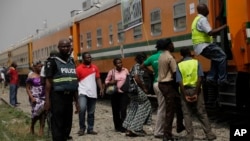A senior United Nations official is warning of a potential migration crisis in the Sahel region of Africa because of conflict, climate change, abject poverty and a lack of opportunity for young people at home.
The U.N. says the Sahel countries are among the nations most at risk for crises and disasters. It reports more than 24 million people in the nine Sahelian countries are expected to suffer from moderate to severe hunger next year. It warns about 750,000 children across the region will lose their lives because of malnutrition-related causes.
Toby Lanzer, the regional humanitarian coordinator for the Sahel, says he is particularly worried about worsening conditions for millions of people living around the Lake Chad Basin.
Lanzer says many communities in Niger, Nigeria, Chad, and Cameroon depend on the lake for their livelihoods, noting it has shrunk to a small proportion of its original size over the last 50 years. He says this is putting enormous pressure upon these communities and increasing social tensions.
Boko Haram
Boko Haram
- Based in the northeastern city of Maiduguri
- Self-proclaimed leader is Abubakar Shekau
- Began in 2002 as a nonviolent Islamist splinter group
- Launched uprising in 2009
- Has killed tens of thousands since 2010
- Boko Haram translates to "Western education is sinful"
- Wants Nigeria to adopt strict Islamic law
Boko Haram threat
Besides being one of the world’s climate change hotspots, he says the region is beset by conflict, violence and massive displacement due to Nigeria’s Boko Haram militants.
Lanzer says the Nigerian government has made recent gains by reigning in Boko Haram; but that this has only served to have the group change its tactics and increase the number of suicide bombings by children as young as seven.
He says two-and-a-half million people have been displaced as a result of Boko Haram violence and counterinsurgency operations by the four countries. He says many are migrating to other countries out of desperation.
“I think to be fair, we should not cast what is happening in the Lake Chad Basin as an immediate contributor to the issue of migration, vis-a-vis Europe. That would not be fair; however, is that something that could be on the cards? Absolutely. At the moment, 20 percent of people arriving in Europe from Africa are from Nigeria.”
Lanzer says they are not from areas affected by Boko Haram, but adds the situation could change rapidly and he would not be surprised to see more people victimized by Boko Haram heading for Europe to seek asylum.
